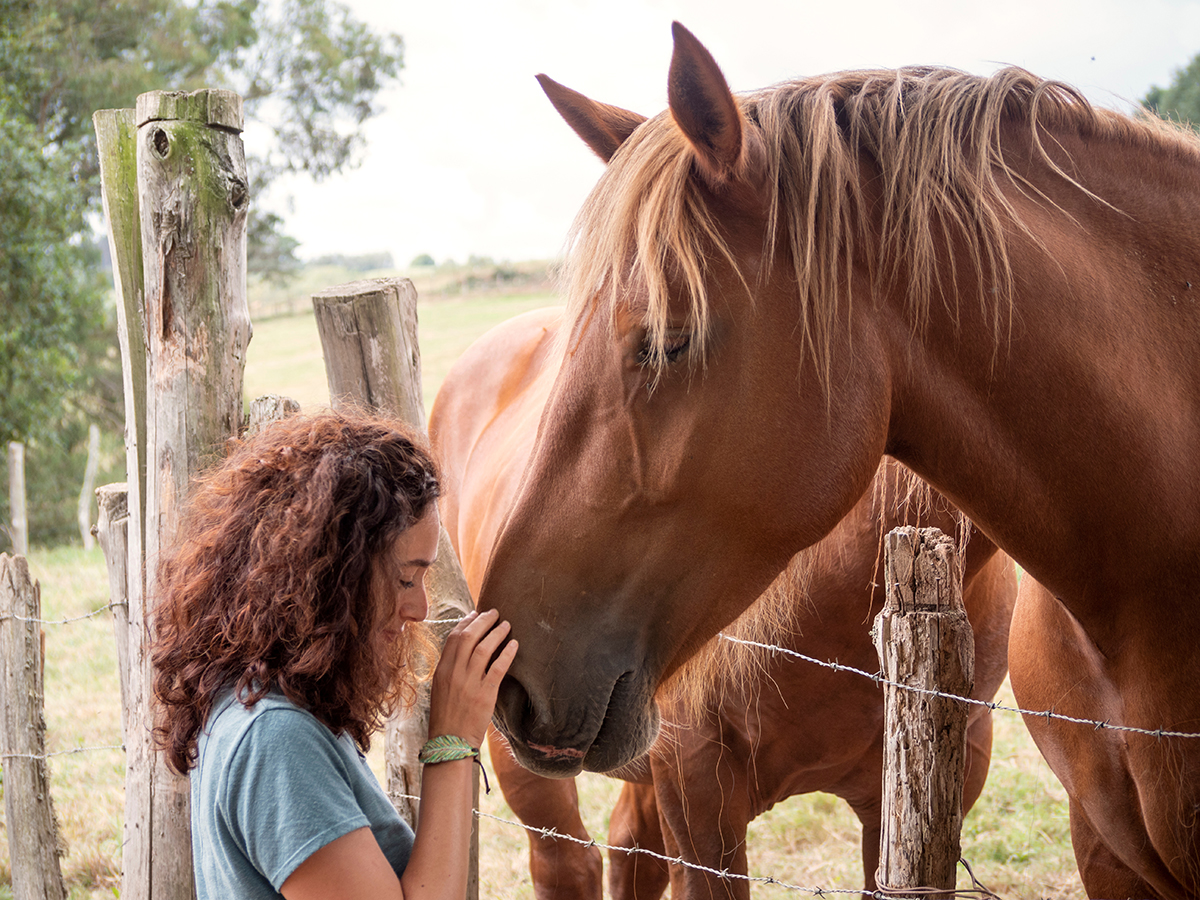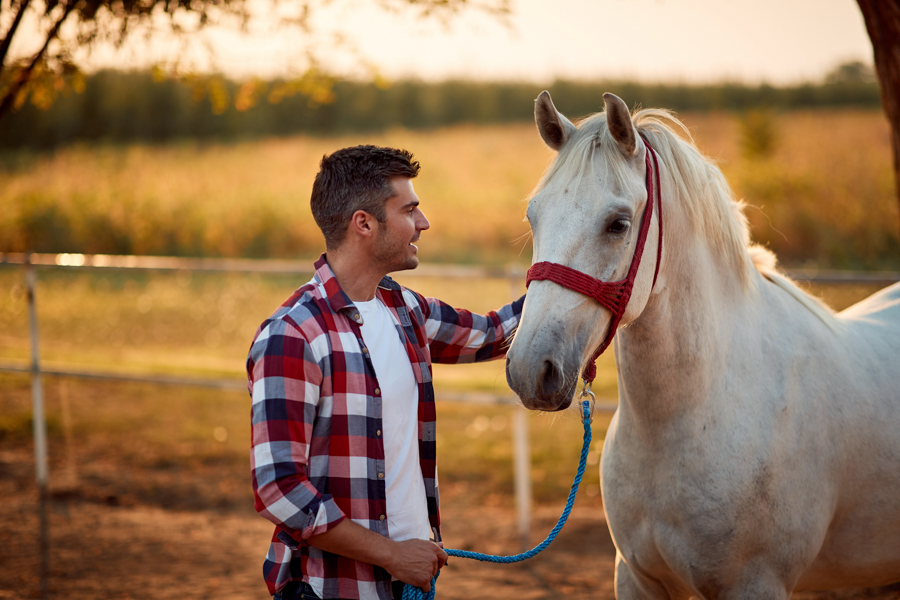At First Steps Recovery, we are committed to providing our clients with innovative and effective treatment options for overcoming addiction. Among the various therapeutic modalities we offer, equine therapy stands out as a unique and powerful approach that utilizes the natural bond between humans and horses to facilitate healing. Located in Clovis, CA, our equine therapy program offers a serene and supportive environment where clients can engage with horses in a way that promotes emotional growth and personal development.
Equine therapy is not just a complementary treatment but an integral part of our holistic approach to addiction recovery. It helps clients develop essential life skills, rebuild their confidence, and learn new ways to cope with stress and emotional challenges. Through the nurturing presence of horses, clients can experience profound healing and transformation.

Equine therapy, also known as equine-assisted therapy or horse therapy, involves therapeutic interactions between patients and horses. This therapy is guided by mental health professionals and equine specialists who create structured activities that help clients explore their emotions, behaviors, and interpersonal relationships. The non-judgmental and responsive nature of horses makes them ideal partners in therapy, offering immediate feedback and fostering a safe space for clients to work through their issues.
In equine therapy sessions, clients might engage in activities such as grooming, feeding, leading, and riding horses. These interactions are designed to challenge and support clients as they develop trust, patience, and empathy. The physical presence of the horse and the tactile engagement required in caring for these animals add layers of therapeutic value that go beyond traditional talk therapy.
Equine therapy offers a multitude of benefits for individuals recovering from addiction. The therapeutic interactions with horses help clients to:
Equine therapy sessions are carefully structured to provide therapeutic benefits while ensuring the safety of both clients and horses. Each session typically involves several key components:

Horses are naturally intuitive animals that can mirror the emotions and behaviors of the people around them. Their sensitivity and responsiveness make them ideal partners in therapy. Horses provide immediate, honest feedback through their actions and reactions, helping clients to gain insights into their own behaviors and emotional states.
In equine therapy, horses act as a mirror, reflecting the client’s emotional state. This mirroring effect helps clients to see themselves more clearly and understand how their emotions and behaviors affect those around them. Horses require clear, consistent communication, which helps clients to develop and refine their interpersonal skills.
Engaging with horses in a therapeutic setting offers numerous emotional and psychological benefits. Clients often report feeling more grounded and centered after their sessions, as the presence of the horses helps them to connect with their emotions in a meaningful way. The physical activities involved in equine therapy also provide an outlet for releasing pent-up energy and tension.
Equine therapy helps clients to develop emotional resilience and coping skills, which are essential for maintaining sobriety. The process of working with horses often requires clients to face their fears and insecurities, fostering personal growth and self-discovery. As clients build trust with the horses, they learn to trust themselves and their ability to navigate the challenges of recovery.
One of the core aspects of equine therapy is the development of trust and communication skills. Horses are social animals that respond to the emotional cues and body language of those around them. To build a successful relationship with a horse, clients must learn to communicate clearly and consistently. This helps to improve their interpersonal skills.
The process of building trust with a horse can be profoundly therapeutic for individuals recovering from addiction. Many clients struggle with trust issues, both with themselves and others. Working with horses helps clients to rebuild trust in a safe and supportive environment, which can then be transferred to their relationships with family, friends, and peers.
Equine therapy is effective for individuals recovering from various types of addiction, including alcohol, opioids, and other substances. The therapeutic process helps clients to address the underlying emotional and psychological issues that contribute to their addiction, promoting lasting recovery.
For individuals struggling with alcohol addiction, equine therapy provides a safe space to explore the emotions and behaviors that drive their drinking. The non-judgmental presence of the horses allows clients to open up and express themselves in ways they may not feel comfortable doing in traditional therapy settings.
For those recovering from opioid addiction, equine therapy helps to build self-esteem and a sense of purpose. The responsibility of caring for the horses and the physical activities involved in the therapy sessions provide a healthy outlet for energy and help to rebuild physical strength and coordination.
At First Steps Recovery, equine therapy is integrated with a range of evidence-based treatments to provide comprehensive care for our clients. Our holistic approach includes therapies such as cognitive-behavioral therapy (CBT), dialectical behavior therapy (DBT), trauma-informed therapy, residential treatment programs in california and more. By combining equine therapy with these modalities, we address the physical, emotional, and psychological aspects of addiction recovery.
Equine therapy complements traditional talk therapies by providing experiential learning opportunities that reinforce the concepts discussed in therapy sessions. For example, clients might work on developing healthy coping mechanisms in cognitive-behavioral therapy sessions and then apply these skills during equine therapy activities. This integration helps to create a cohesive treatment plan that supports lasting recovery.
Equine therapy can benefit individuals of all ages who are struggling with addiction and co-occurring mental health disorders. It is particularly effective for those who have difficulty expressing emotions and building trust. The hands-on, experiential nature of equine therapy provides a unique therapeutic approach that can reach individuals who may not respond as well to traditional therapy methods.
Yes, equine therapy is conducted in a controlled environment with trained professionals, ensuring the safety and well-being of both clients and horses. Our therapists and equine specialists work closely to design sessions that are safe and therapeutic, taking into account each client’s needs and abilities. All activities are supervised, and safety protocols are strictly followed to prevent accidents or injuries.
Choosing our equine therapy program means receiving personalized care in a supportive and tranquil environment. Our experienced team, serene facility, and comprehensive approach to addiction treatment set us apart as the best choice for recovery in Fresno County, CA. Here are some reasons to choose First Steps Recovery:
First Steps Recovery offers a comprehensive equine therapy program as part of our holistic approach to addiction treatment. Our facility in Fresno County, CA, provides a tranquil setting where individuals can engage with horses in a safe and supportive environment. The natural beauty of our location enhances the therapeutic experience, offering a peaceful retreat from the stresses of daily life.
Our equine therapy program is designed to complement other treatment modalities we offer, creating a well-rounded approach to recovery. Individuals participating in equine therapy at First Steps Recovery receive personalized care tailored to their specific needs and recovery goals.
Our equine therapy program is facilitated by a team of highly qualified and experienced professionals. This team includes licensed mental health therapists and certified equine specialists who work together to create a safe and effective therapeutic environment. Our therapists have extensive training in both addiction treatment and equine therapy, ensuring that individuals receive the highest quality care.
The equine specialists at First Steps Recovery are skilled in horsemanship and understand the unique therapeutic potential of horses. They collaborate with our therapists to design and implement sessions that meet the individual needs of each client. This multidisciplinary approach ensures that individuals receive comprehensive support throughout their therapy.
Equine therapy at First Steps Recovery offers a unique and powerful approach to overcoming addiction. By fostering emotional growth, building trust, and enhancing communication skills, our equine therapy program provides a path to lasting recovery.
Ready to learn more about our equine therapy program? Contact First Steps Recovery today to learn more. We are here to answer your questions and help you take the first step toward a healthier, addiction-free life.

From our certified therapists and nurses to our emotional support animal "Cooper", our entire team is dedicated to the health and success of our clients throughout our program and beyond.
Have questions about our experiential therapies? Let’s talk.
Experiential therapy is a form of therapy that encourages patients to confront and explore their emotions through experiences, hence the name. It’s not your typical sit-down-and-talk kind of therapy.
Equine therapy works with clients that have behavior issues, autism, and developmental disabilities and works with vets suffering from PTSD.
Massage therapy has become increasingly recognized as a valuable tool in the journey of addiction recovery. As individuals navigate the challenges of overcoming addiction, massage therapy offers a unique approach to healing both the mind and body.
We believe in the transformative potential of narrative therapy for conquering addiction. Our method is grounded in the recognition that addiction is a deeply personal battle influenced by individual experiences and narratives.
Yoga utilizes physical postures and controlled breathing that help lengthen and strengthen the spine, increase flexibility, and help calm the mind.
Recreation recovery is a new way of living life. Living clean and sober opens people up to whole new ways of having fun and enjoying life.
Physical wellness plays a huge part in the success of recovery. Maintaining a healthy weight, and getting the proper amount of vitamins, minerals, and proteins are all essential to repairing the damage done by drugs and alcohol.
Mindfulness therapy is a type of therapy that focuses on learning to notice thoughts, feelings, and surroundings without automatic responses.
Dayatra L.
Melissa B.
Bruce G.
Have questions about how our alumni program works? Let's talk.










Have questions about First Steps Recovery? We're here to help.
© Copyright 2023 • First Steps Recovery • All Rights Reserved